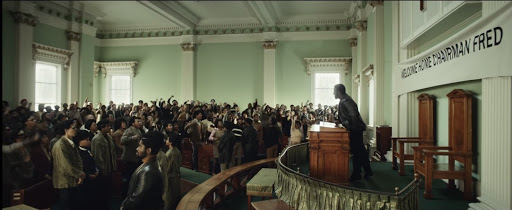Fred Hampton (Daniel Kaluuya), Chairman of the Illinois chapter of the Black Panther Party speaking to the chapter. Hampton arrived home from prison while appealing his sentence after being arrested for stealing $71 worth of ice cream. (Screengrab courtesy of Dayna Wilkerson)
Judas and the Black Messiah, a movie inspired by the true story of Fred Hampton and the Illinois chapter of the Black Panther Party, started streaming on HBO Max and played in theatres on February 12.
People should watch this movie to understand Black advancements in the ‘60s, not just what is portrayed in schools and media. It is especially necessary to watch after the racial justice protests of last summer, shedding a light on Black lives and culture.
The film depicts William “Bill” O’Neal (LaKeith Stanfield), a carjacker who is caught and arrested for posing as a police officer. Rather than jail time, he received the deal of a lifetime: The Federal Bureau of Investigation (FBI) offered O’Neal a paid job to infiltrate the Black Panther Party and report to FBI agent Roy Mitchell.
Shortly after his arrest, O’Neal joins the Black Panther Party and grows closer to Fred Hampton, the Chairman of the Illinois chapter of the Black Panther Party.
When O’Neal joined the Party, Hampton was trying to bring together oppressed groups in the area so they could revolutionize against systemic racism and oppression from the government and police.
Hampton convinced the local KKK chapter, Latino community, and other Black organizations to create the Rainbow Coalition, a group of oppressed communities in the Chicago area.
O’Neal quickly told Mitchell about the Rainbow Coalition, and the FBI brought up a fraudulent charge of stealing ice cream against Hampton. The judge sentenced Hampton to two years in prison.
While Hampton is in prison, O’Neal stays with the organization and continues reporting to his FBI agent. Despite reporting back to Mitchell, O’Neal slowly becomes more loyal to the party.
After a shootout between the police and the party, the officers blow up the party headquarters. O’Neal helps the party rebuild the headquarters.
Soon after that, O’Neal says he is not involved in the FBI anymore, and he does not want to report to Mitchell.
A few months later, Hampton is released on parole and reassumes his power as the Chairman.
When Hampton made his first appearance after being released from prison, O’Neal spotted Mitchell watching him.
His rebellion does not last long after the FBI reminded O’Neal they will put him in jail if he does not comply. Mitchell forces O’Neal to draw the schematics of Hampton’s apartment.
Not long after, an undercover informant for the FBI gives O’Neal a strong sedative to slip into Hampton’s drink.
At the end of the movie, O’Neal tearfully slips the drugs into Hampton’s drink.
Later that night, the Chicago Police Department raided the apartment shooting 99 rounds into the apartment. Hampton’s pregnant girlfriend, Deborah Johnson, threw herself onto him to protect him from the gunfire.
The police found and shot Hampton in his bed after he was not severely injured.
At the end of the film, it talks about the aftermath of Hampton’s death. O’Neal committed suicide in 1990 after doing an on-screen interview about his undercover work.
Months after the assassination, the survivors sued the FBI, Chicago Police Department, and the State Attorney’s office on conspiracy to assassinate Hampton for $47.7 million. Both sides settled the case with $1.58 million.
The story, which Johnson contributed to by providing details, brings the injustice depicted in the movie to a larger audience.
The movie held extraordinary portrayals from Kaluuya and Stanfield.
Kaluuya depicted Hampton powerfully and represented what he stood for. Kaluuya’s portrayal made you feel something about Hampton and what he was trying to achieve.
Stanfield successfully showed O’Neal’s struggle playing both sides and making the viewer conflicted on how to think of him.
This movie about black power and its sad downfall from the federal government of the sixties shows a story many Americans do not know. There are so many more stories that need to be told, that hopefully will be pursued in the future.
Overall, the movie is outstanding with the character portrayals and storytelling. Judas and the Black Messiah should be a front-runner for awards next awards season.

Hey guys! My name is Dayna, and I am the Editor-in-Chief of the Mycenaean this school year. I love reading, cooking/baking, and hanging out with my friends and family!

Leave a Reply